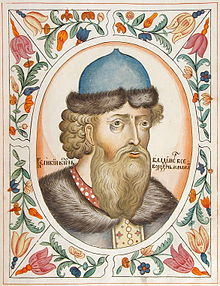Vladimir II Monomakh
You can help expand this article with text translated from the corresponding article in French. (February 2014) Click [show] for important translation instructions.
|
| Vladimir II Monomakh | |
|---|---|
Eastern Orthodox |

Vladimir II Monomakh (
Family background
In 1046, to seal an armistice in the
Vsevolod Yaroslavich, the fifth son of the grand prince of Kiev,
Reign
This section needs additional citations for verification. (April 2024) |

In his famous Instruction (also known as The Testament) to his own children, Monomakh mentions that he conducted 83 military campaigns and 19 times made peace with the
In 1068 he allied with the Cuman chief Bilge-Tegin.[6] From 1094, his chief patrimony was the southern town of
In 1107 he defeated
In 1111, Vladimir, alongside Sviatopolk II, led an army at the Battle of the Salnytsia River, where they defeated a Cuman army on the Salnytsia river. The site of this battle is probably at modern-day Izium.[7]
When
Vladimir Monomakh was buried at
Marriages and children
This section needs additional citations for verification. (April 2024) |
Vladimir married three times. The 13th-century chronicler
They had at least the following children:
- Mstislav I of Kiev (1 June 1076 – 14 April 1132)
- Izyaslav Vladimirovich, Prince of Kursk (c. 1077 – 6 September 1096)
- Svyatoslav Vladimirovich, Pereyaslav(c. 1080 – 16 March 1114)
- Yaropolk II of Kiev (1082 – 18 February 1139)
- Viacheslav I of Kiev (1083 – 2 February 1154)
A daughter has been attributed to either the first or the second wife:
- .
Vladimir's second wife, Euphemia, is considered to have been a Byzantine noblewoman.[4] This marriage produced at least five children:
- Volhynia(d. 6 January 1119)
- Coloman of Hungary.
- Agafia (Agatha). Married Vsevolod Davidovich, Prince of Volhynia (d. 1113), but this theory was rejected.[8]
- Yuri(George), later known as Yuri Dolgoruki (d. 15 May 1157).
- Volhynia(11 July 1102 – 1141).
Vladimir's third marriage is thought to have been to a daughter of Aepa Ocenevich, Khan of the
However the Primary Chronicle identifies Aepa as father-in-law to Yuri Dolgoruki, with Vladimir negotiating the marriage in name of his son.[citation needed] Whether father and son married sisters or the identity of intended groom was misidentified remains unclear.
See also
Notes
References
- ISBN 0334030412.
- ISBN 9780198604730.
- ^ "Владимир Мономах". Drevo (in Russian). Retrieved 3 July 2020.
- ^ a b Kazhdan 1989, pp. 416–417.
- ^ Kazhdan 1991, p. 1398.
- ^ Pilipchuk 2017, 262
- ^ "Ізюм, Ізюмський район, Харківська область". Історія міст і сіл Української РСР (in Ukrainian). Retrieved 25 October 2023.
- ^ Oleg Łatyszonek, Wczesnośredniowieczne księstwo grodzieńskie w historiografii ostatniego dwudziestolecia, p. 10.
Sources
- Dimnik, Martin (2016). Power Politics in Kievan Rus': Vladimir Monomakh and His Dynasty, 1054–1246. Pontifical Institute of Mediaeval Studies. ISBN 978-0-88844-202-4.
- Kazhdan, Alexander (1989). "Rus'-Byzantine Princely Marriages in the Eleventh and Twelfth Centuries". Harvard Ukrainian Studies. 12/13. Harvard Ukrainian Research Institute: 414–429.
- ISBN 978-0-19-504652-6
Further reading
- Nenarokova, Maria (2008). "Vladimir Monomakh's Instruction: An Old Russian Pedagogic Treatise". In Juanita, Feros Ruys (ed.). What Nature Does Not Teach: Didactic Literature in the Medieval and Early-Modern Periods. Turnhout, Brepols. pp. 109–128.
External links
- Arkadii Zhukovsky, Volodymyr Monomakh in the Internet Encyclopedia of Ukraine, vol. 5 (1993)
- English biography
- Karamzin's account of Monomakh
- Instruction of Vladimir Monomakh
- The Pouchenie of Vladimir Monomakh www.dur.ac.uk
- (Russian) The Pouchenie of Vladimir Monomakh monomah.vladimir.ru
- Ross, Kelley L. (2012) [1990]. "Successors of Rome: Russia, 862-Present". Friesian School, Fourth Series.
